1998 OPEL FRONTERA sensor
[x] Cancel search: sensorPage 1264 of 6000
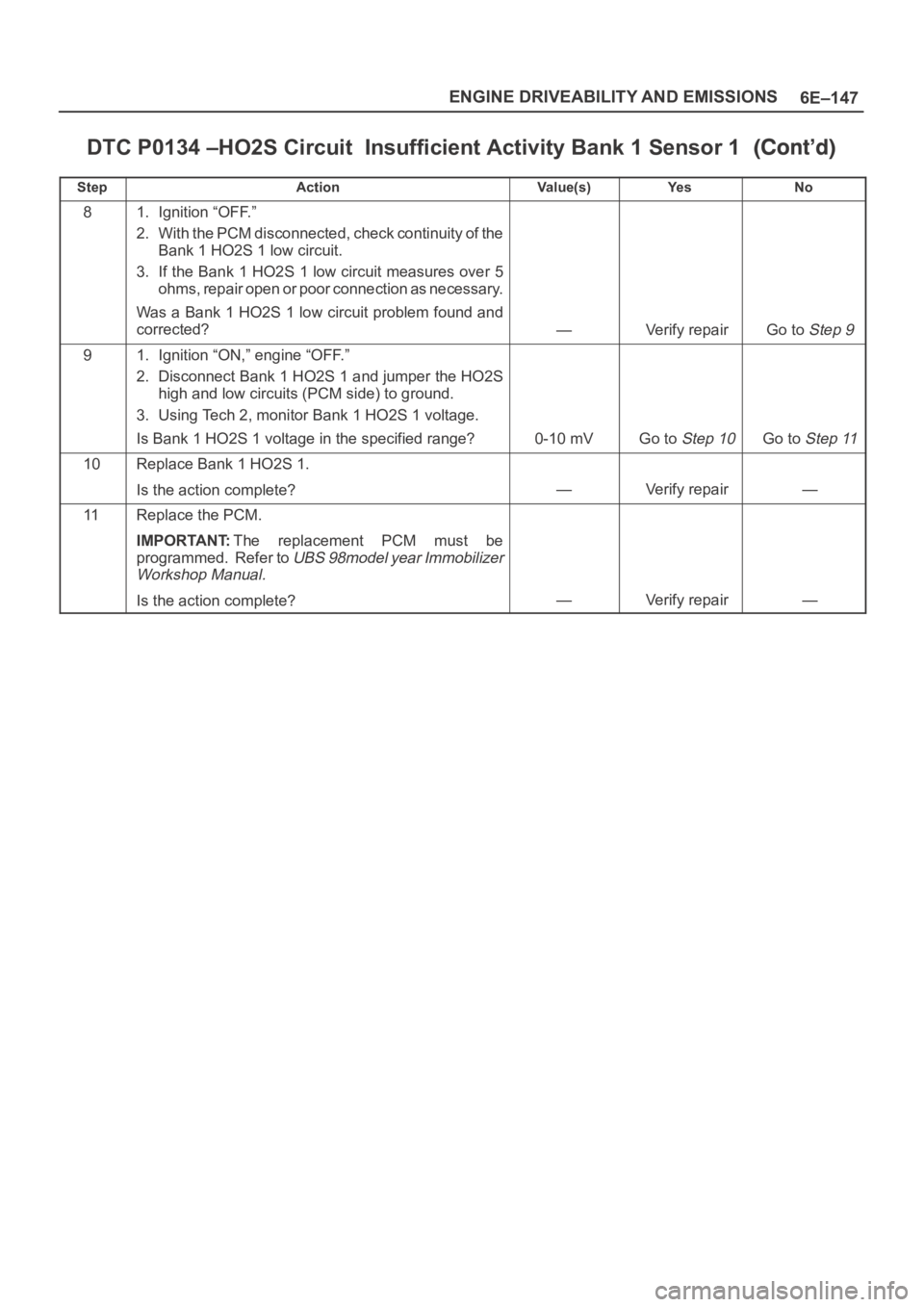
6E–147 ENGINE DRIVEABILITY AND EMISSIONS
DTC P0134 –HO2S Circuit Insufficient Activity Bank 1 Sensor 1
StepNo Ye s Va l u e ( s ) Action
81. Ignition “OFF.”
2. With the PCM disconnected, check continuity of the
Bank 1 HO2S 1 low circuit.
3. If the Bank 1 HO2S 1 low circuit measures over 5
ohms, repair open or poor connection as necessary.
Was a Bank 1 HO2S 1 low circuit problem found and
corrected?
—Verify repairGo to Step 9
91. Ignition “ON,” engine “OFF.”
2. Disconnect Bank 1 HO2S 1 and jumper the HO2S
high and low circuits (PCM side) to ground.
3. Using Tech 2, monitor Bank 1 HO2S 1 voltage.
Is Bank 1 HO2S 1 voltage in the specified range?
0-10 mVGo to Step 10Go to Step 11
10Replace Bank 1 HO2S 1.
Is the action complete?
—Verify repair—
11Replace the PCM.
IMPORTANT:The replacement PCM must be
programmed. Refer to
UBS 98model year Immobilizer
Workshop Manual.
Is the action complete?—Verify repair—
Page 1265 of 6000
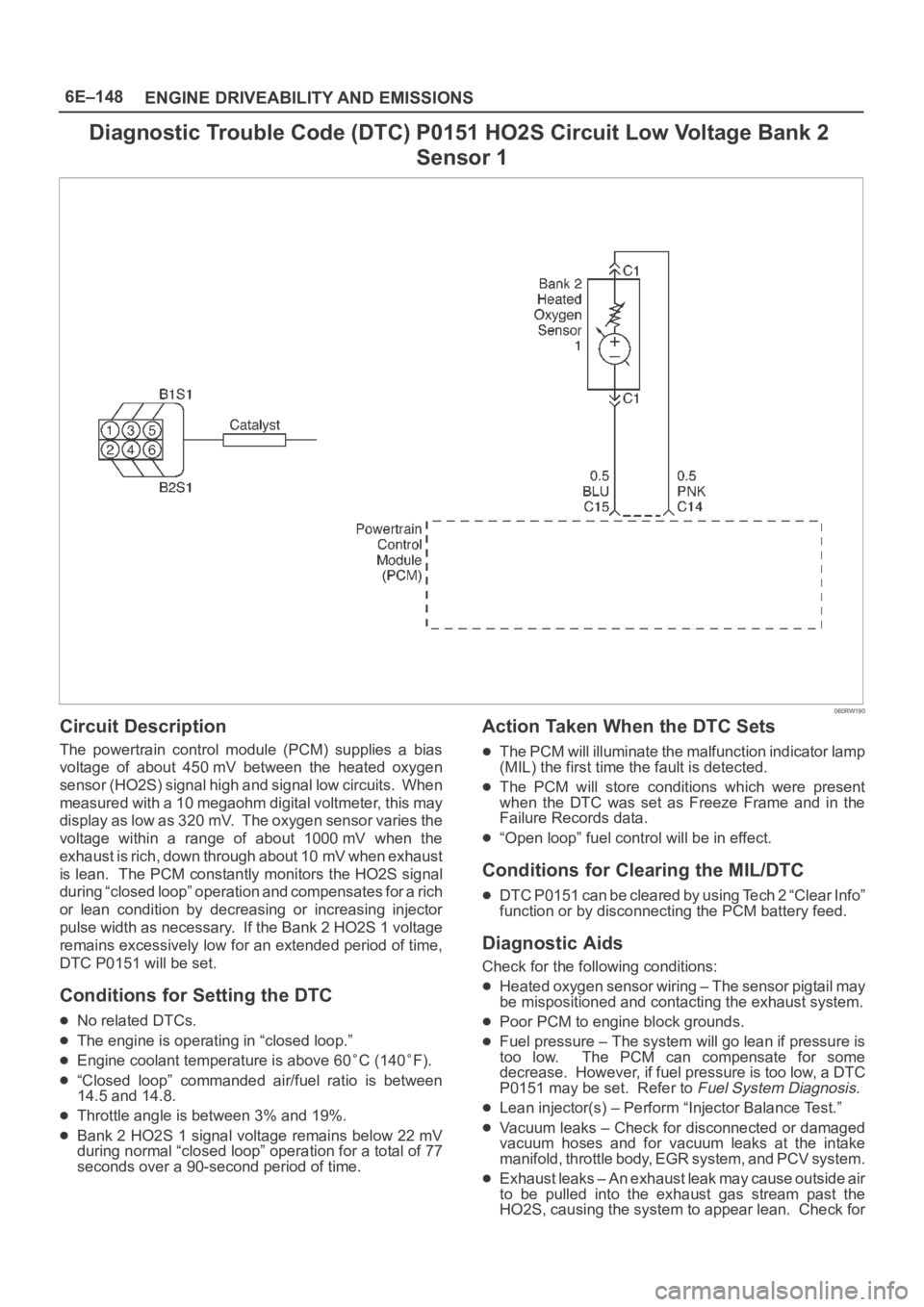
6E–148
ENGINE DRIVEABILITY AND EMISSIONS
Diagnostic Trouble Code (DTC) P0151 HO2S Circuit Low Voltage Bank 2
Sensor 1
060RW190
Circuit Description
The powertrain control module (PCM) supplies a bias
voltage of about 450 mV between the heated oxygen
sensor (HO2S) signal high and signal low circuits. When
measured with a 10 megaohm digital voltmeter, this may
display as low as 320 mV. The oxygen sensor varies the
voltage within a range of about 1000 mV when the
exhaust is rich, down through about 10 mV when exhaust
is lean. The PCM constantly monitors the HO2S signal
during “closed loop” operation and compensates for a rich
or lean condition by decreasing or increasing injector
pulse width as necessary. If the Bank 2 HO2S 1 voltage
remains excessively low for an extended period of time,
DTC P0151 will be set.
Conditions for Setting the DTC
No related DTCs.
The engine is operating in “closed loop.”
Engine coolant temperature is above 60C (140F).
“Closed loop” commanded air/fuel ratio is between
14.5 and 14.8.
Throttle angle is between 3% and 19%.
Bank 2 HO2S 1 signal voltage remains below 22 mV
during normal “closed loop” operation for a total of 77
seconds over a 90-second period of time.
Action Taken When the DTC Sets
The PCM will illuminate the malfunction indicator lamp
(MIL) the first time the fault is detected.
The PCM will store conditions which were present
when the DTC was set as Freeze Frame and in the
Failure Records data.
“Open loop” fuel control will be in effect.
Conditions for Clearing the MIL/DTC
DTC P0151 can be cleared by using Tech 2 “Clear Info”
function or by disconnecting the PCM battery feed.
Diagnostic Aids
Check for the following conditions:
Heated oxygen sensor wiring – The sensor pigtail may
be mispositioned and contacting the exhaust system.
Poor PCM to engine block grounds.
Fuel pressure – The system will go lean if pressure is
too low. The PCM can compensate for some
decrease. However, if fuel pressure is too low, a DTC
P0151 may be set. Refer to
Fuel System Diagnosis.
Lean injector(s) – Perform “Injector Balance Test.”
Vacuum leaks – Check for disconnected or damaged
vacuum hoses and for vacuum leaks at the intake
manifold, throttle body, EGR system, and PCV system.
Exhaust leaks – An exhaust leak may cause outside air
to be pulled into the exhaust gas stream past the
HO2S, causing the system to appear lean. Check for
Page 1266 of 6000
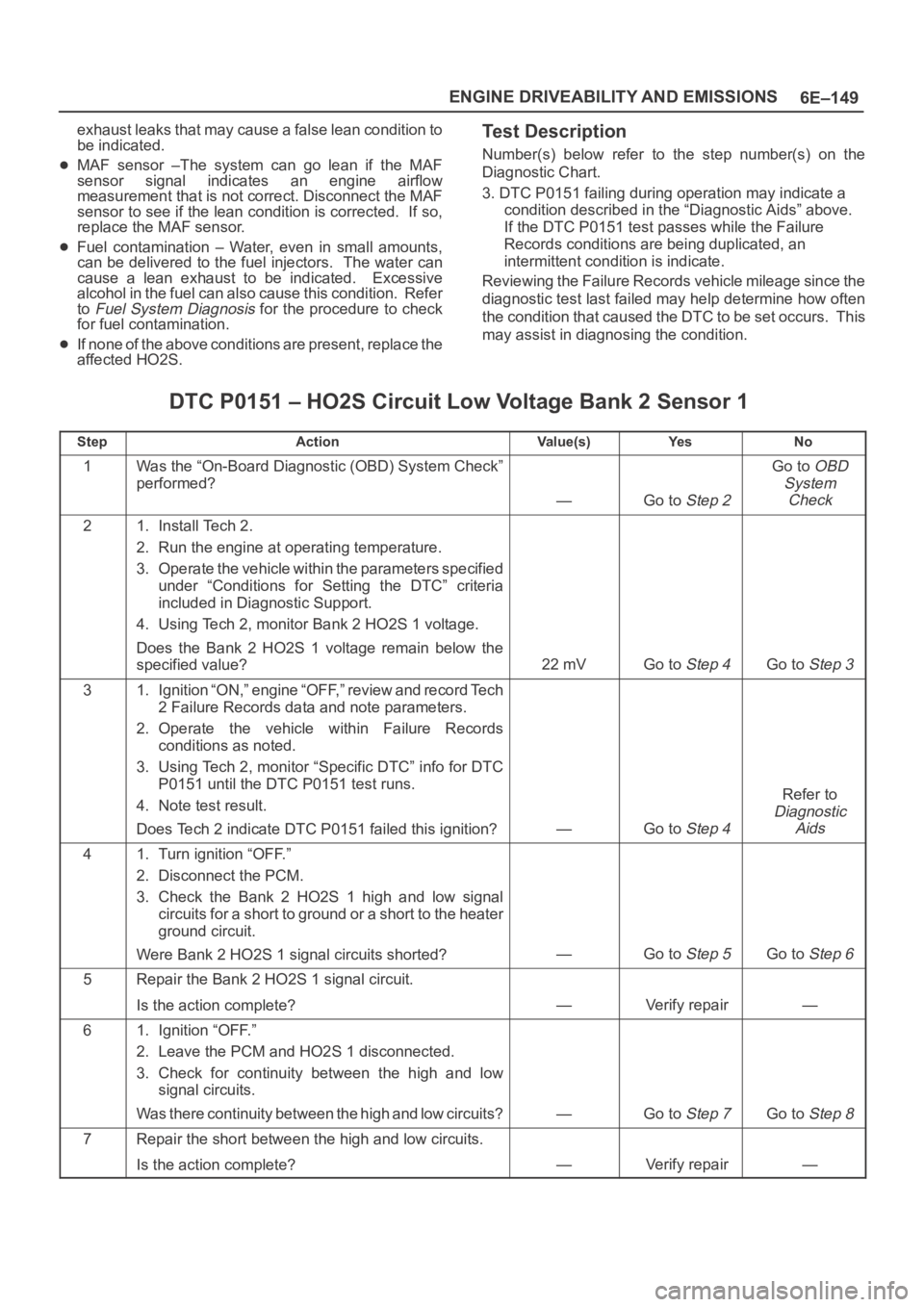
6E–149 ENGINE DRIVEABILITY AND EMISSIONS
exhaust leaks that may cause a false lean condition to
be indicated.
MAF sensor –The system can go lean if the MAF
sensor signal indicates an engine airflow
measurement that is not correct. Disconnect the MAF
sensor to see if the lean condition is corrected. If so,
replace the MAF sensor.
Fuel contamination – Water, even in small amounts,
can be delivered to the fuel injectors. The water can
cause a lean exhaust to be indicated. Excessive
alcohol in the fuel can also cause this condition. Refer
to
Fuel System Diagnosis for the procedure to check
for fuel contamination.
If none of the above conditions are present, replace the
affected HO2S.
Test Description
Number(s) below refer to the step number(s) on the
Diagnostic Chart.
3. DTC P0151 failing during operation may indicate a
condition described in the “Diagnostic Aids” above.
If the DTC P0151 test passes while the Failure
Records conditions are being duplicated, an
intermittent condition is indicate.
Reviewing the Failure Records vehicle mileage since the
diagnostic test last failed may help determine how often
the condition that caused the DTC to be set occurs. This
may assist in diagnosing the condition.
DTC P0151 – HO2S Circuit Low Voltage Bank 2 Sensor 1
StepActionVa l u e ( s )Ye sNo
1Was the “On-Board Diagnostic (OBD) System Check”
performed?
—Go to Step 2
Go to OBD
System
Check
21. Install Tech 2.
2. Run the engine at operating temperature.
3. Operate the vehicle within the parameters specified
under “Conditions for Setting the DTC” criteria
included in Diagnostic Support.
4. Using Tech 2, monitor Bank 2 HO2S 1 voltage.
Does the Bank 2 HO2S 1 voltage remain below the
specified value?
22 mVGo to Step 4Go to Step 3
31. Ignition “ON,” engine “OFF,” review and record Tech
2 Failure Records data and note parameters.
2. Operate the vehicle within Failure Records
conditions as noted.
3. Using Tech 2, monitor “Specific DTC” info for DTC
P0151 until the DTC P0151 test runs.
4. Note test result.
Does Tech 2 indicate DTC P0151 failed this ignition?
—Go to Step 4
Refer to
Diagnostic
Aids
41. Turn ignition “OFF.”
2. Disconnect the PCM.
3. Check the Bank 2 HO2S 1 high and low signal
circuits for a short to ground or a short to the heater
ground circuit.
Were Bank 2 HO2S 1 signal circuits shorted?
—Go to Step 5Go to Step 6
5Repair the Bank 2 HO2S 1 signal circuit.
Is the action complete?
—Verify repair—
61. Ignition “OFF.”
2. Leave the PCM and HO2S 1 disconnected.
3. Check for continuity between the high and low
signal circuits.
Was there continuity between the high and low circuits?
—Go to Step 7Go to Step 8
7Repair the short between the high and low circuits.
Is the action complete?
—Verify repair—
Page 1267 of 6000
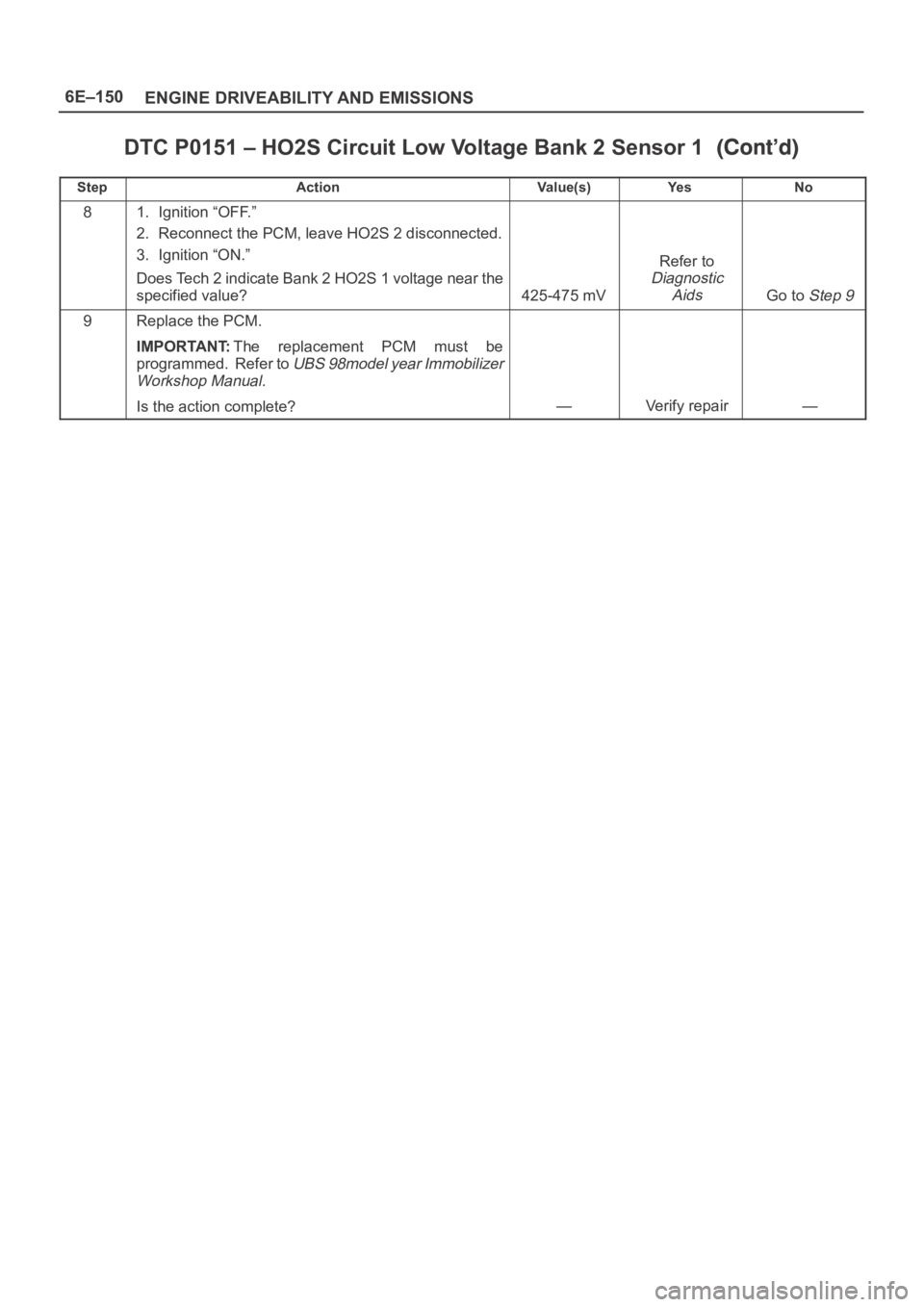
6E–150
ENGINE DRIVEABILITY AND EMISSIONS
DTC P0151 – HO2S Circuit Low Voltage Bank 2 Sensor 1
StepNo Ye s Va l u e ( s ) Action
81. Ignition “OFF.”
2. Reconnect the PCM, leave HO2S 2 disconnected.
3. Ignition “ON.”
Does Tech 2 indicate Bank 2 HO2S 1 voltage near the
specified value?
425-475 mV
Refer to
Diagnostic
Aids
Go to Step 9
9Replace the PCM.
IMPORTANT:The replacement PCM must be
programmed. Refer to
UBS 98model year Immobilizer
Workshop Manual.
Is the action complete?—Verify repair—
Page 1268 of 6000
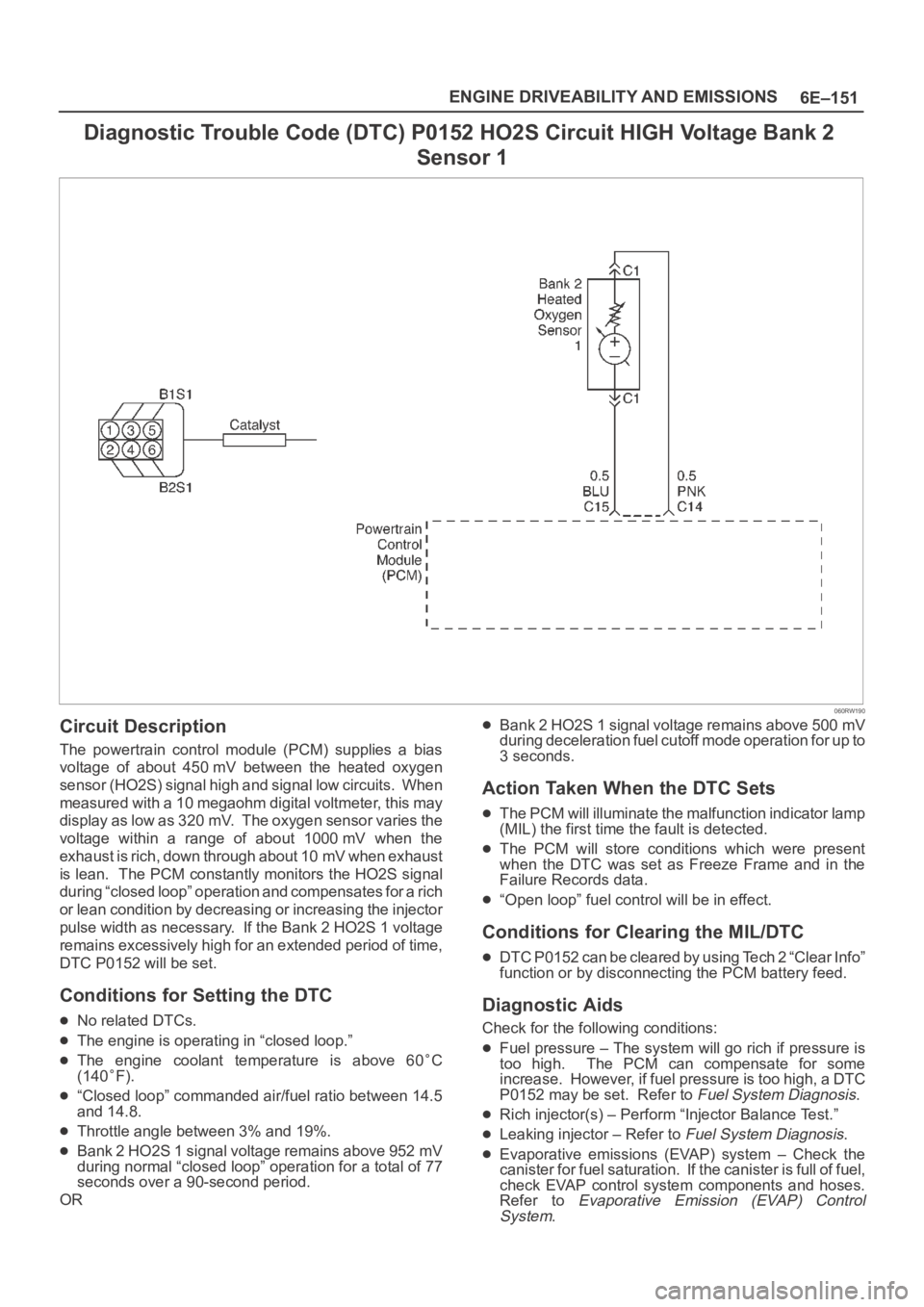
6E–151 ENGINE DRIVEABILITY AND EMISSIONS
Diagnostic Trouble Code (DTC) P0152 HO2S Circuit HIGH Voltage Bank 2
Sensor 1
060RW190
Circuit Description
The powertrain control module (PCM) supplies a bias
voltage of about 450 mV between the heated oxygen
sensor (HO2S) signal high and signal low circuits. When
measured with a 10 megaohm digital voltmeter, this may
display as low as 320 mV. The oxygen sensor varies the
voltage within a range of about 1000 mV when the
exhaust is rich, down through about 10 mV when exhaust
is lean. The PCM constantly monitors the HO2S signal
during “closed loop” operation and compensates for a rich
or lean condition by decreasing or increasing the injector
pulse width as necessary. If the Bank 2 HO2S 1 voltage
remains excessively high for an extended period of time,
DTC P0152 will be set.
Conditions for Setting the DTC
No related DTCs.
The engine is operating in “closed loop.”
The engine coolant temperature is above 60C
(140
F).
“Closed loop” commanded air/fuel ratio between 14.5
and 14.8.
Throttle angle between 3% and 19%.
Bank 2 HO2S 1 signal voltage remains above 952 mV
during normal “closed loop” operation for a total of 77
seconds over a 90-second period.
OR
Bank 2 HO2S 1 signal voltage remains above 500 mV
during deceleration fuel cutoff mode operation for up to
3 seconds.
Action Taken When the DTC Sets
The PCM will illuminate the malfunction indicator lamp
(MIL) the first time the fault is detected.
The PCM will store conditions which were present
when the DTC was set as Freeze Frame and in the
Failure Records data.
“Open loop” fuel control will be in effect.
Conditions for Clearing the MIL/DTC
DTC P0152 can be cleared by using Tech 2 “Clear Info”
function or by disconnecting the PCM battery feed.
Diagnostic Aids
Check for the following conditions:
Fuel pressure – The system will go rich if pressure is
too high. The PCM can compensate for some
increase. However, if fuel pressure is too high, a DTC
P0152 may be set. Refer to
Fuel System Diagnosis.
Rich injector(s) – Perform “Injector Balance Test.”
Leaking injector – Refer to Fuel System Diagnosis.
Evaporative emissions (EVAP) system – Check the
canister for fuel saturation. If the canister is full of fuel,
check EVAP control system components and hoses.
Refer to
Evaporative Emission (EVAP) Control
System
.
Page 1269 of 6000
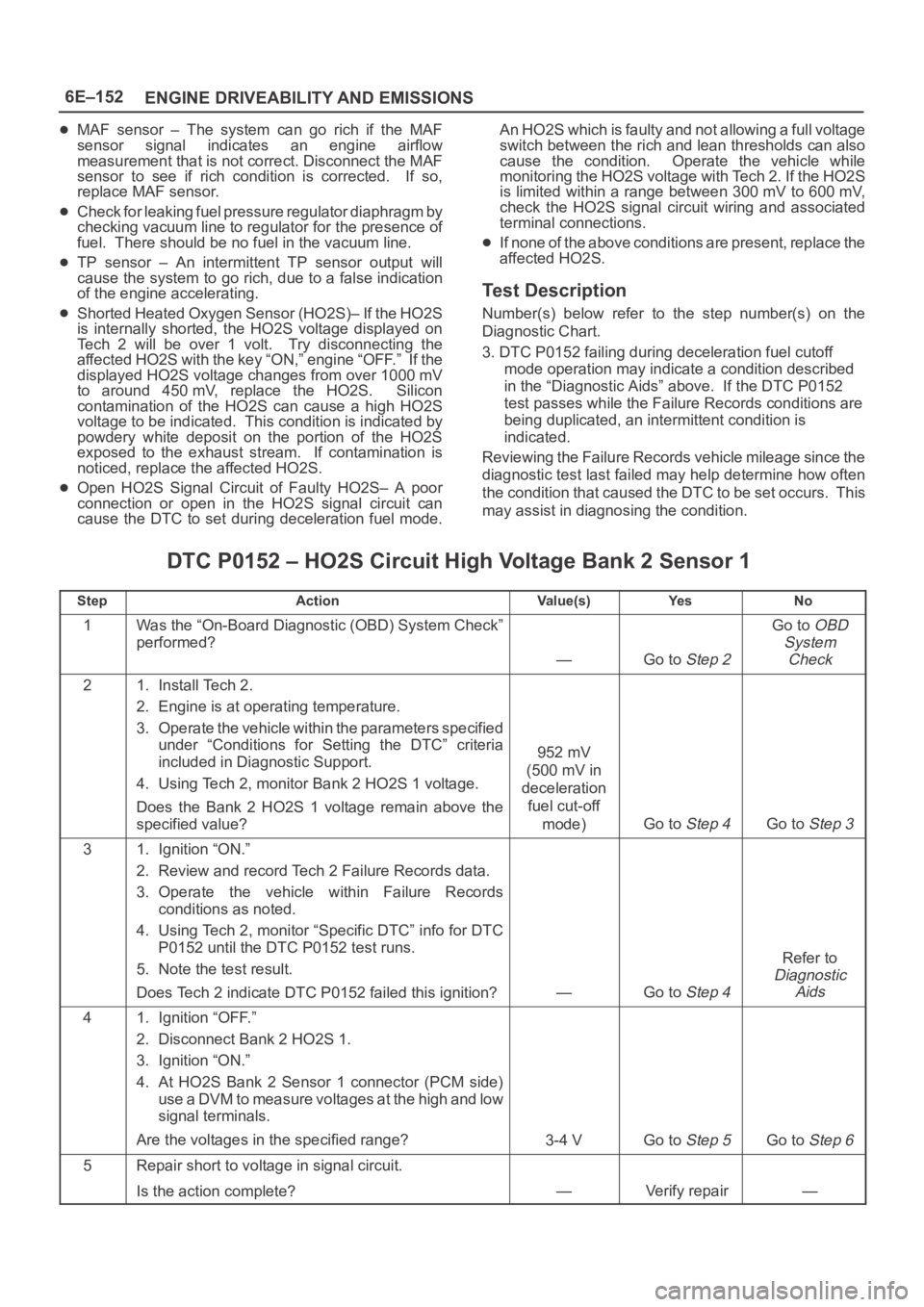
6E–152
ENGINE DRIVEABILITY AND EMISSIONS
MAF sensor – The system can go rich if the MAF
sensor signal indicates an engine airflow
measurement that is not correct. Disconnect the MAF
sensor to see if rich condition is corrected. If so,
replace MAF sensor.
Check for leaking fuel pressure regulator diaphragm by
checking vacuum line to regulator for the presence of
fuel. There should be no fuel in the vacuum line.
TP sensor – An intermittent TP sensor output will
cause the system to go rich, due to a false indication
of the engine accelerating.
Shorted Heated Oxygen Sensor (HO2S)– If the HO2S
is internally shorted, the HO2S voltage displayed on
Tech 2 will be over 1 volt. Try disconnecting the
affected HO2S with the key “ON,” engine “OFF.” If the
displayed HO2S voltage changes from over 1000 mV
to around 450mV, replace the HO2S. Silicon
contamination of the HO2S can cause a high HO2S
voltage to be indicated. This condition is indicated by
powdery white deposit on the portion of the HO2S
exposed to the exhaust stream. If contamination is
noticed, replace the affected HO2S.
Open HO2S Signal Circuit of Faulty HO2S– A poor
connection or open in the HO2S signal circuit can
cause the DTC to set during deceleration fuel mode.An HO2S which is faulty and not allowing a full voltage
switch between the rich and lean thresholds can also
cause the condition. Operate the vehicle while
monitoring the HO2S voltage with Tech 2. If the HO2S
is limited within a range between 300 mV to 600 mV,
check the HO2S signal circuit wiring and associated
terminal connections.
If none of the above conditions are present, replace the
affected HO2S.
Test Description
Number(s) below refer to the step number(s) on the
Diagnostic Chart.
3. DTC P0152 failing during deceleration fuel cutoff
mode operation may indicate a condition described
in the “Diagnostic Aids” above. If the DTC P0152
test passes while the Failure Records conditions are
being duplicated, an intermittent condition is
indicated.
Reviewing the Failure Records vehicle mileage since the
diagnostic test last failed may help determine how often
the condition that caused the DTC to be set occurs. This
may assist in diagnosing the condition.
DTC P0152 – HO2S Circuit High Voltage Bank 2 Sensor 1
StepActionVa l u e ( s )Ye sNo
1Was the “On-Board Diagnostic (OBD) System Check”
performed?
—Go to Step 2
Go to OBD
System
Check
21. Install Tech 2.
2. Engine is at operating temperature.
3. Operate the vehicle within the parameters specified
under “Conditions for Setting the DTC” criteria
included in Diagnostic Support.
4. Using Tech 2, monitor Bank 2 HO2S 1 voltage.
Does the Bank 2 HO2S 1 voltage remain above the
specified value?
952 mV
(500 mV in
deceleration
fuel cut-off
mode)
Go to Step 4Go to Step 3
31. Ignition “ON.”
2. Review and record Tech 2 Failure Records data.
3. Operate the vehicle within Failure Records
conditions as noted.
4. Using Tech 2, monitor “Specific DTC” info for DTC
P0152 until the DTC P0152 test runs.
5. Note the test result.
Does Tech 2 indicate DTC P0152 failed this ignition?
—Go to Step 4
Refer to
Diagnostic
Aids
41. Ignition “OFF.”
2. Disconnect Bank 2 HO2S 1.
3. Ignition “ON.”
4. At HO2S Bank 2 Sensor 1 connector (PCM side)
use a DVM to measure voltages at the high and low
signal terminals.
Are the voltages in the specified range?
3-4 VGo to Step 5Go to Step 6
5Repair short to voltage in signal circuit.
Is the action complete?
—Verify repair—
Page 1270 of 6000
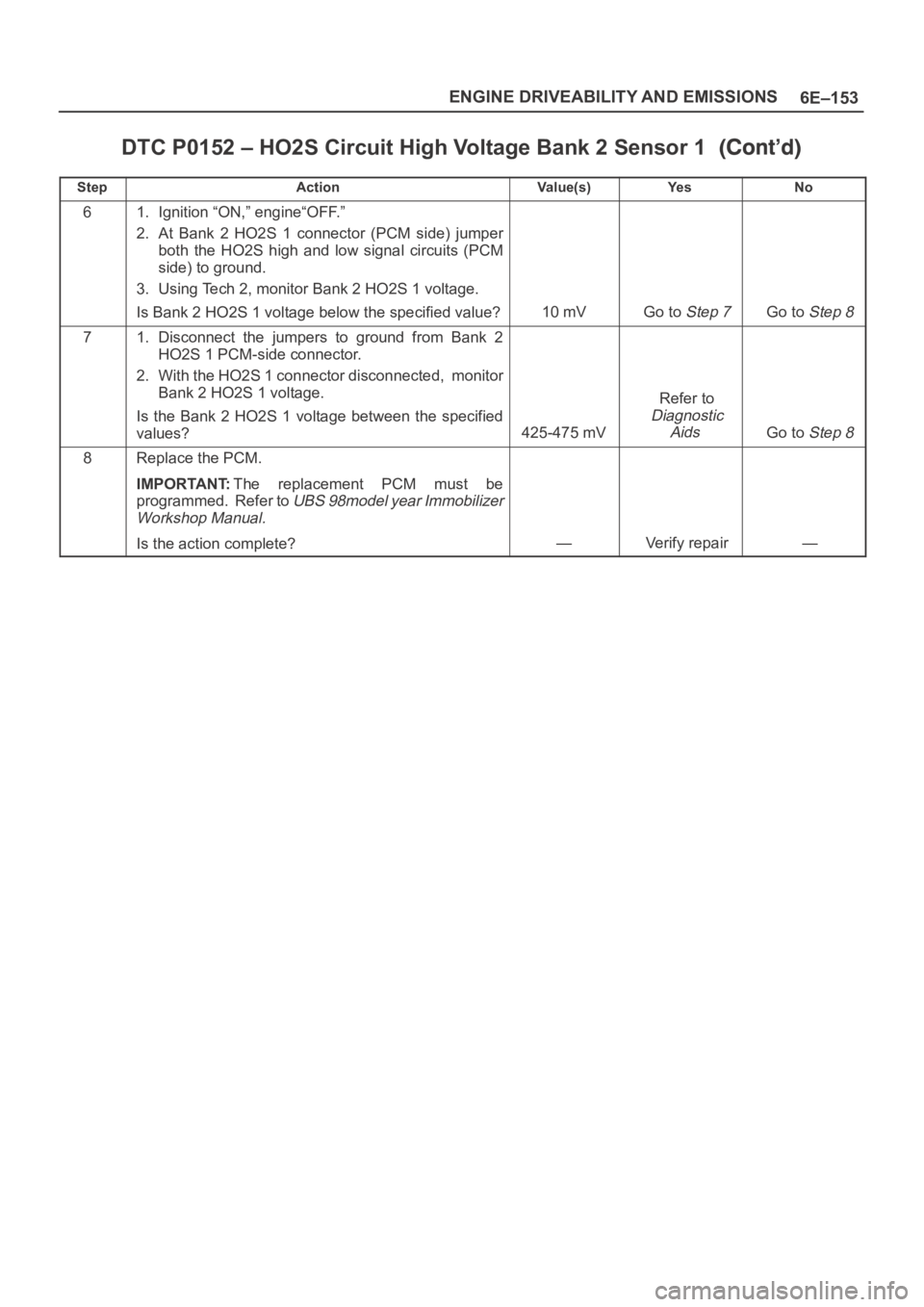
6E–153 ENGINE DRIVEABILITY AND EMISSIONS
DTC P0152 – HO2S Circuit High Voltage Bank 2 Sensor 1
StepNo Ye s Va l u e ( s ) Action
61. Ignition “ON,” engine“OFF.”
2. At Bank 2 HO2S 1 connector (PCM side) jumper
both the HO2S high and low signal circuits (PCM
side) to ground.
3. Using Tech 2, monitor Bank 2 HO2S 1 voltage.
Is Bank 2 HO2S 1 voltage below the specified value?
10 mVGo to Step 7Go to Step 8
71. Disconnect the jumpers to ground from Bank 2
HO2S 1 PCM-side connector.
2. With the HO2S 1 connector disconnected, monitor
Bank 2 HO2S 1 voltage.
Is the Bank 2 HO2S 1 voltage between the specified
values?
425-475 mV
Refer to
Diagnostic
Aids
Go to Step 8
8Replace the PCM.
IMPORTANT:The replacement PCM must be
programmed. Refer to
UBS 98model year Immobilizer
Workshop Manual.
Is the action complete?—Verify repair—
Page 1271 of 6000
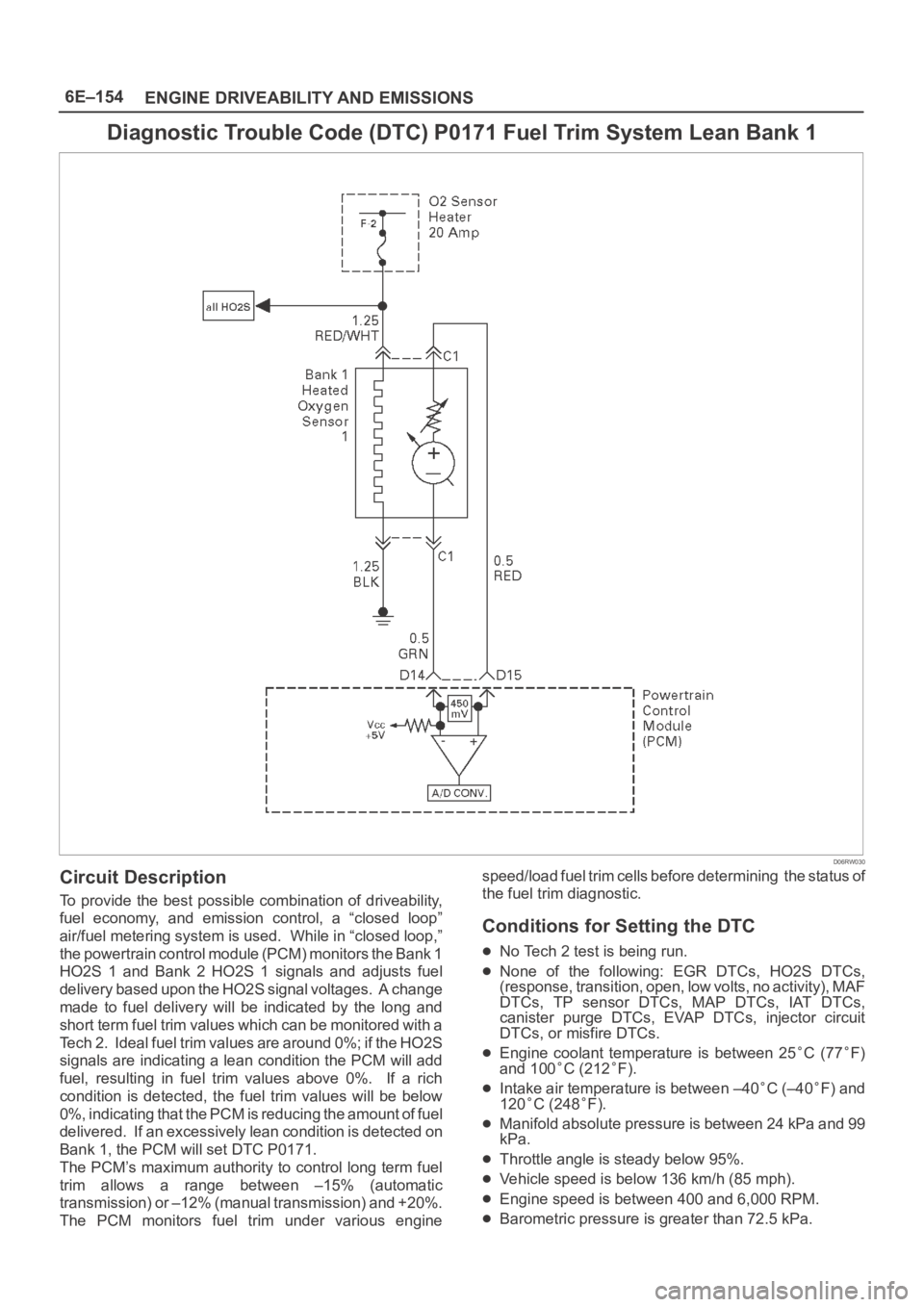
6E–154
ENGINE DRIVEABILITY AND EMISSIONS
Diagnostic Trouble Code (DTC) P0171 Fuel Trim System Lean Bank 1
D06RW030
Circuit Description
To provide the best possible combination of driveability,
fuel economy, and emission control, a “closed loop”
air/fuel metering system is used. While in “closed loop,”
the powertrain control module (PCM) monitors the Bank 1
HO2S 1 and Bank 2 HO2S 1 signals and adjusts fuel
delivery based upon the HO2S signal voltages. A change
made to fuel delivery will be indicated by the long and
short term fuel trim values which can be monitored with a
Tech 2. Ideal fuel trim values are around 0%; if the HO2S
signals are indicating a lean condition the PCM will add
fuel, resulting in fuel trim values above 0%. If a rich
condition is detected, the fuel trim values will be below
0%, indicating that the PCM is reducing the amount of fuel
delivered. If an excessively lean condition is detected on
Bank 1, the PCM will set DTC P0171.
The PCM’s maximum authority to control long term fuel
trim allows a range between –15% (automatic
transmission) or –12% (manual transmission) and +20%.
The PCM monitors fuel trim under various enginespeed/load fuel trim cells before determining the status of
the fuel trim diagnostic.
Conditions for Setting the DTC
No Tech 2 test is being run.
None of the following: EGR DTCs, HO2S DTCs,
(response, transition, open, low volts, no activity), MAF
DTCs, TP sensor DTCs, MAP DTCs, IAT DTCs,
canister purge DTCs, EVAP DTCs, injector circuit
DTCs, or misfire DTCs.
Engine coolant temperature is between 25C (77F)
and 100C (212F).
Intake air temperature is between –40C (–40F) and
120C (248F).
Manifold absolute pressure is between 24 kPa and 99
kPa.
Throttle angle is steady below 95%.
Vehicle speed is below 136 km/h (85 mph).
Engine speed is between 400 and 6,000 RPM.
Barometric pressure is greater than 72.5 kPa.